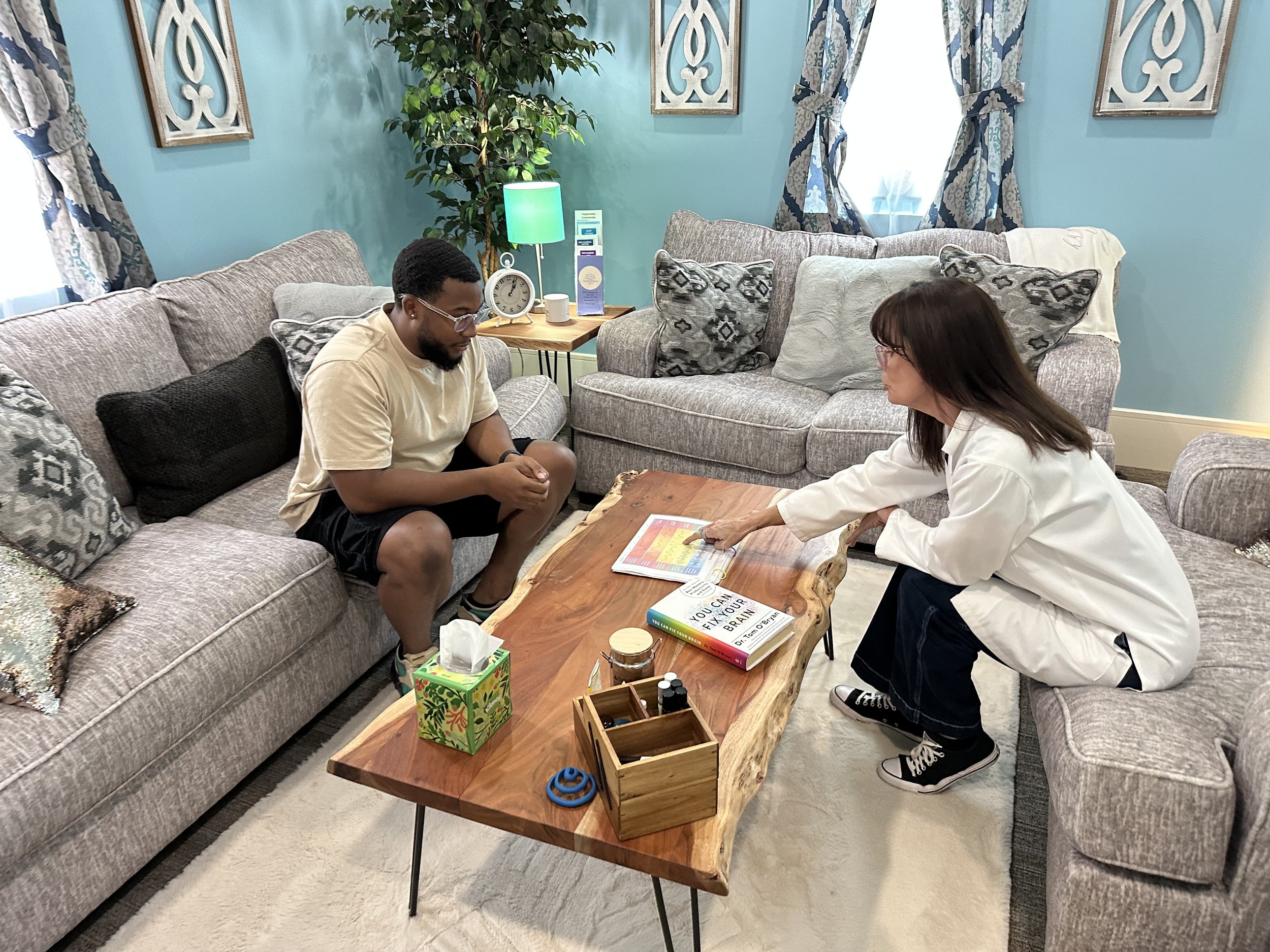
We’re always here to answer your questions! If we’ve missed something, please reach out for more information.
FAQs
What Is Neurofeedback?
Neurofeedback is a gentle, non-invasive way to help your brain work better. It’s a form of biofeedback that uses your brain’s own electrical activity—called brainwaves—to help your brain learn to calm down, focus, and function more efficiently.
Think of it like holding up a mirror to your brain. By showing the brain what it’s doing in real time, we can guide it to make healthier patterns. Over time, this can reduce symptoms like anxiety, poor focus, sleep issues, or mood swings.
Neurofeedback doesn’t “zap” or change your brain—it simply gives it helpful feedback so it can learn to regulate itself naturally.
What Can Neurofeedback Help With?
Neurofeedback has been shown to help with a wide range of concerns, including:
ADHD / ADD
Anxiety and stress
Sleep problems
Depression
Concussions or brain injuries
Chronic pain
PTSD and trauma
Migraines and headaches
It’s also used by high performers—like athletes, executives, and creatives—to boost mental clarity, focus, and performance.
What Is a Treatment Protocol?
A treatment protocol is just the plan we use to guide your brain training sessions. Everyone’s brain is different, so we customize the approach based on your brainwave patterns and your symptoms.
Your brain produces different kinds of waves—like alpha, beta, theta, and delta. Each type is linked to a different mental state (like focus, relaxation, or sleep). Depending on what you’re struggling with—like anxiety, ADHD, or trauma—we’ll choose the right combination of waves to work on during your sessions.
We record your brain’s electrical signals (EEG) by placing small sensors on your scalp. These sensors simply listen to your brain activity, like a stethoscope listens to a heartbeat. Then we use that information to guide your brain toward balance.
How Does It Work?
Neurofeedback is based on neuroplasticity, which means your brain can change and grow when it’s given the right kind of support. When your brain sees what it’s doing in real time, it begins to learn—just like it learned to walk, talk, or ride a bike.
Here’s the cool part: You don’t even have to “do” anything. During a session, you might watch a movie or listen to music. When your brain makes healthier patterns, the screen stays bright or the sound stays clear. When your brain slips into less helpful patterns, the screen dims or the sound changes. Your brain picks up on this feedback automatically—and starts adjusting to get more of the “reward.” Over time, it learns to stay in those better states.
What to Expect in a Session
Neurofeedback is relaxing and easy. You’ll sit comfortably while small sensors are placed on your scalp. You’ll then watch a movie, listen to music, or play a game. The software gives your brain subtle cues—like dimming the screen or adjusting the volume—based on what your brain is doing.
These cues gently guide your brain to healthier patterns. You don’t have to think about it or try to control anything—it’s like your brain is learning in the background. A trained clinician is with you the whole time to monitor the session and make sure you’re comfortable.
Do You Take Insurance?
We are a cash-pay practice, which means we do not work directly with insurance companies. Why? Because we believe in protecting your privacy, your treatment choices, and your time. Working outside of insurance allows us to tailor care to your unique needs without the restrictions and limitations that insurance often places on mental health services.
However, many clients are able to use out-of-network benefits or health savings accounts (HSAs/FSAs) to cover part of the cost. We’re happy to provide detailed receipts (superbills) that you can submit to your insurance company for potential reimbursement.
We have had several clients successfully submit their superbills to insurance. The cost is applied towards the plan deductible, and in some cases where clients have a diagnosis of ADHD/ADD, TBI (traumatic brain injury), or SUD (substance use disorder-alcohol) have been fully reimbursed.

